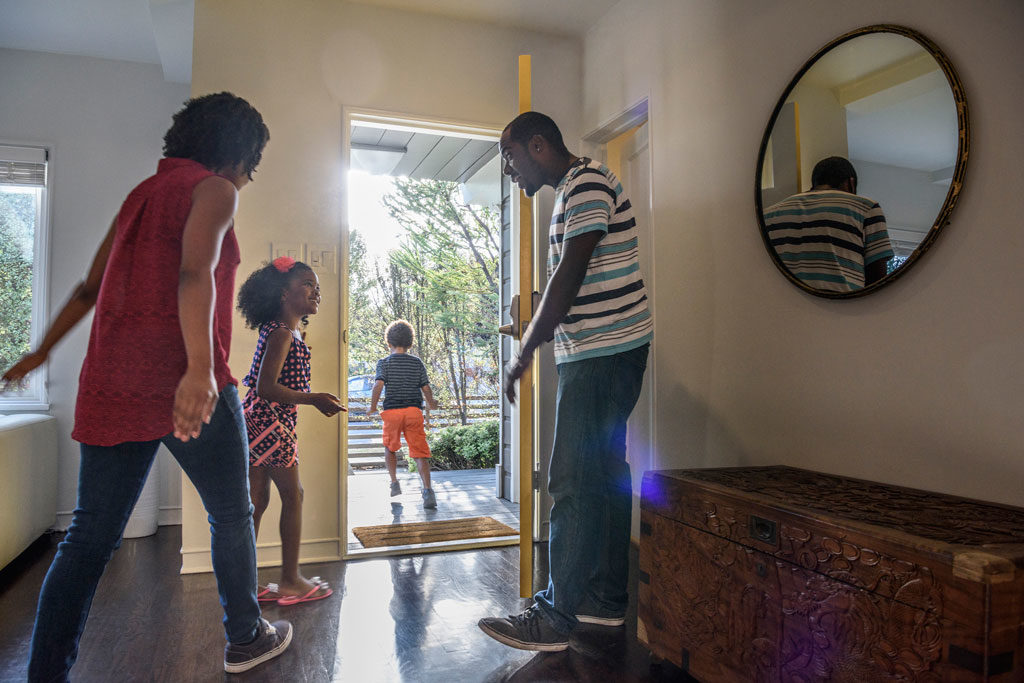Indoor Air Quality Solutions
Posted on by WestAIR Heating & Cooling

Ever looked at a ray of light streaming through your windows and noticed floating dust particles? The sunlight can reveal a lot about a room’s air quality. While it may be tempting to open up the windows and doors for a quick fix, we’re in the thick of ragweed season, so it probably won’t do you any favors. The EPA recommends upgrading your HVAC filter or using an air cleaner to reduce harmful airborne particles. Read our blog to learn why and discover some more indoor air quality solutions.
New filters
Your HVAC filter traps microorganisms, animal fur, hair, lint, dander, mold, pollen, dirt, and more so they don’t accumulate in your system or irritate your lungs. Check your filter once a month to see if it needs replacing. A clogged air filter can cause your HVAC equipment to overheat, short cycle, or even break down. At the very least, changing a dirty filter could lower your energy bills because your system won’t have to work twice as hard just to obtain adequate airflow.
Air cleaner
An air cleaner uses a filter to trap particles like bacteria, mold, ragweed, pet dander, and dust mites. It can even eliminate viruses, kill germs, neutralize fumes, and remove odors. Those with allergies, asthma, or sensitivity to chemicals can benefit from an air cleaner, which can remove up to 97 percent of pollen-sized particles.
Air exchanger
Every time you cook, shower, clean, and breathe, you release pollutants into the air. Airtight buildings are more energy efficient, but they need to somehow circulate air to maintain a healthy environment. Without adequate ventilation, old air will sit in enclosed spaces and accumulate dust, bacteria, mold, and other harmful particles.
An air exchanger provides refreshed, filtered air to reduce these allergens. Air exchangers use two fans, one to take stale air out, and the other to pull in fresh air, run it through a filter, and disperse it through the ductwork.
Dehumidifier
Humidity makes a room seem hotter than it is and increases the likelihood of mold and mildew growth. Drier air feels cooler. A dehumidifier can increase your comfort and allow you to raise the temperature a few degrees to save on cooling expenses. You can use a portable unit or install a whole house dehumidifier that works in conjunction with your HVAC system.
Dehumidifiers pull moist air over a cooling coil that condenses the moisture vapor into droplets. Moisture along the coils drips into a collection pan or directly down a drain.
Duct cleaning
In most HVAC systems, all the conditioned air passes through ductwork to supply vents in each room, and back through return registers to be conditioned again. Particles floating in the air could become trapped in the many channels and crevices behind your walls. If the ductwork is dirty, your indoor air will be, too, no matter what air cleaning accessories you install. During air duct cleaning, your technician will use powerful vacuums and brushes to dislodge debris and allow proper airflow.
Bonus tip
Plants clean the air of carbon dioxide and can remove cancer-causing formaldehyde, benzene, and other toxins. If you are looking for an inexpensive way to purify your indoor air, bring in some potted vegetation. They can improve your physical health as well as your mental well-being by reducing stress, building memory retention, and increasing concentration, which in turn boosts productivity.
At WestAIR, we care about you and your family’s health and comfort. We offer air quality solutions to rid your home or business of harmful pollutants and provide fresh oxygen, day in, and day out.
Contact us to learn more.
This entry was posted in Duct Cleaning,Indoor Air Quality,Tips and tagged Air circulation, Air cleaner, Air filters, Allergies, Asthma, Clean HVAC ducts, Comfortable, Cooling, Energy efficiency, Energy savings, Humidity, HVAC, HVAC tips, Indoor air quality, Indoor air quality solutions
HVAC Tips for Summer Trips
Posted on by WestAIR Heating & Cooling

What exciting summer trips do you have planned? Before you pack up those bags and lock the door, take time to make sure your air conditioning will fare well while you are gone. Proper preparation will save you money on utility bills and keep your home’s air quality safe. So before you leave town, check out these HVAC tips for summer trips:
Don’t turn your HVAC system off
Many homeowners think they need to turn their cooling off to save money while they’re away in the summer. But you may end up spending more than you saved trying to cool your home back down when you return. An HVAC system doesn’t just regulate temperature, it also circulates air, controls humidity, and keeps indoor pollutants at bay. If you turn it off in the summer, humidity levels may rise, and you could come home to mold issues.
Program your thermostat
Before you leave, set the thermostat four degrees higher than your normal comfortable temperature, but keep it below 85 degrees. Check out the smart thermostats we offer with easy, seven-day programming and humidity control so you can rest assured your home is in good hands.
Prepare for rain
Install a full-house surge protector to save your system from power outages in case of a large summer storm or downed power lines. A surge protector will absorb the electrical overload and channel it into the ground so the power doesn’t damage your HVAC units.
Seal your home
Close all doors, windows, blinds, curtains, and storm shutters. Your home will stay cooler if you block the sun out, and conditioned air will remain inside if your home is sealed from the elements. Make sure supply and return registers are open so air circulates freely throughout the home.
Unplug
Unplugging electronics before you leave for vacation will help your system cool more efficiently. Some appliances still generate heat even if they aren’t being used. If you plan to be away for a significant amount of time, empty and unplug the refrigerator and turn down the water heater.
Give your equipment some attention
Even if you’ve just recently serviced your equipment, it’s important to check it before you leave it unattended. Replace the air filter if it’s dirty and clear the outdoor units of anything that would obstruct airflow. Pull away weeds, trim shrubbery, remove branches or twigs resting on the unit, and unclog the condensate drain if it is blocked.
Call WestAIR
Finally, schedule service so you don’t have to worry when you are states away enjoying vacation with your family. Our technicians will recharge the refrigerant if it’s low, clean the evaporator coils, and address any issues your air conditioning unit may have.
WestAIR Heating & Cooling provides cooling solutions to fit your home and budget. We offer energy-efficient A/C units, smart thermostats, filters, air cleaners, and more. Contact us today.
This entry was posted in Air Conditioning,Cooling,Tips and tagged A/C, A/C tune-up, Air circulation, air conditioning, Air filters, Comfortable, Cooling, Cooling system, Energy efficiency, Energy savings, HVAC, HVAC tips, Indoor air quality, Window curtains
Dry Indoor Air + Humidification
Posted on by WestAIR Heating & Cooling
 Winter is already uncomfortable enough with the freezing temperatures, so why not make the most of your cozy indoor living space where you can escape the dry and brittle cold air? Lower temperatures mean lower humidity levels because cold air can’t hold as much moisture as warm air. Here are two simple reasons your dry indoor air needs humidification:
Winter is already uncomfortable enough with the freezing temperatures, so why not make the most of your cozy indoor living space where you can escape the dry and brittle cold air? Lower temperatures mean lower humidity levels because cold air can’t hold as much moisture as warm air. Here are two simple reasons your dry indoor air needs humidification:
Your comfort
Overly dry air can make your skin and respiratory problems flare up, from asthma and allergies to eczema and acne. If your home air is too dry, it could cause bloody noses, chapped lips, and itchy skin. Your respiratory system is lined with moist membranes in your nose and throat that prevent bacteria, viruses, dirt, and dust from getting into your lungs. If they are dry, they won’t keep particles out effectively, making you more vulnerable to sickness.
In addition, dry air increases static electricity, which produces painful shocks and zaps when you walk around on the carpet or touch metal surfaces. It will also make your hair more difficult to maintain and cause your clothes to stick to you uncomfortably.
Your belongings
Dry air will pull moisture from hardwood floors, furniture, and even the walls, doors, and general frame of your home, making it contract and shift. As the frame shifts, doors may be hard to open and close, or gaps may form between the ceiling, walls, windows, and door frames.
Books, artwork, and even the paint or wallpaper on your walls can get brittle, warped, or wrinkled in dry air. If you have musical instruments, they may lose their shape and tune. Humid air feels warmer, so moderate levels of humidity can allow you to set the thermostat lower and give your heating system a break. That way, you can live comfortably and save money on your heating bill and maintenance. But be careful: excess moisture may cause mold, bacteria, and mildew growth in poorly ventilated areas of your home.
You can keep an ideal, comfortable humidity level between 40 and 60 percent with a whole home humidifier. WestAIR Heating & Cooling offers whole house humidifiers that will keep every room of your home comfortable, even in the dry winter. Our humidifiers will automatically work with your HVAC system to distribute moisture throughout your home’s entire duct system. We offer programmable thermostats that come with a built-in humidity sensor so you can test and regulate home humidity and avoid going overboard.
Contact us to learn more about your heating and indoor air quality options.
This entry was posted in Energy Savings,Furnace,Health Tips,Heating,Humidifier,Indoor Air Quality,Tips,Winter and tagged Dry air, Heating, HVAC tips, Indoor air quality, Whole house humidifier
Subscribe to Our Blog
With RSS feeds, you don't have to visit our site everyday to keep up to date. Simply subscribe to our blog via RSS or Email and our posts will come to you!
Search Blog Posts
Categories
Archives
- April 2024 (1)
- February 2024 (1)
- January 2024 (1)
- February 2023 (1)
- January 2023 (1)
- December 2022 (1)
- November 2022 (1)
- October 2022 (1)
- September 2022 (1)
- August 2022 (1)
- July 2022 (1)
- June 2022 (1)
- May 2022 (1)
- April 2022 (1)
- March 2022 (1)
- February 2022 (2)
- December 2021 (1)
- November 2021 (1)
- October 2021 (1)
- September 2021 (1)
- August 2021 (1)
- July 2021 (1)
- June 2021 (1)
- May 2021 (1)
- April 2021 (1)
- March 2021 (2)
- January 2021 (1)
- December 2020 (1)
- November 2020 (1)
- October 2020 (1)
- September 2020 (1)
- August 2020 (1)
- July 2020 (1)
- June 2020 (1)
- May 2020 (1)
- April 2020 (1)
- March 2020 (1)
- February 2020 (2)
- November 2019 (1)
- August 2019 (2)
- June 2019 (1)
- May 2019 (1)
- April 2019 (1)
- March 2019 (1)
- February 2019 (1)
- January 2019 (1)
- December 2018 (1)
- November 2018 (1)
- October 2018 (1)
- September 2018 (1)
- August 2018 (2)
- July 2018 (1)
- May 2018 (1)
- April 2018 (1)
- March 2018 (1)
- February 2018 (1)
- January 2018 (1)
- December 2017 (3)
- November 2017 (2)
- October 2017 (2)
- September 2017 (2)
- August 2017 (1)
- July 2017 (2)
- June 2017 (3)
- May 2017 (2)
- January 2017 (4)
- November 2016 (1)
- September 2016 (3)
- July 2016 (2)
- June 2016 (2)
- May 2016 (4)
- April 2016 (1)
- March 2016 (2)
- February 2016 (2)
- January 2016 (1)
- August 2015 (1)
- July 2015 (1)
- June 2015 (3)
- May 2015 (1)
- July 2014 (2)
- June 2014 (1)
- April 2014 (1)
- March 2014 (1)
- February 2014 (2)
- October 2013 (1)
- May 2013 (1)
- March 2013 (1)
- February 2013 (1)
- August 2012 (1)
- July 2012 (2)
- June 2012 (2)
- May 2012 (2)
- March 2012 (1)
- February 2012 (1)
- December 2011 (1)
- November 2011 (1)
- October 2011 (1)
- September 2011 (1)
- August 2011 (1)
- June 2011 (1)
- May 2011 (1)
 Subscribe
Subscribe Subscribe
Subscribe